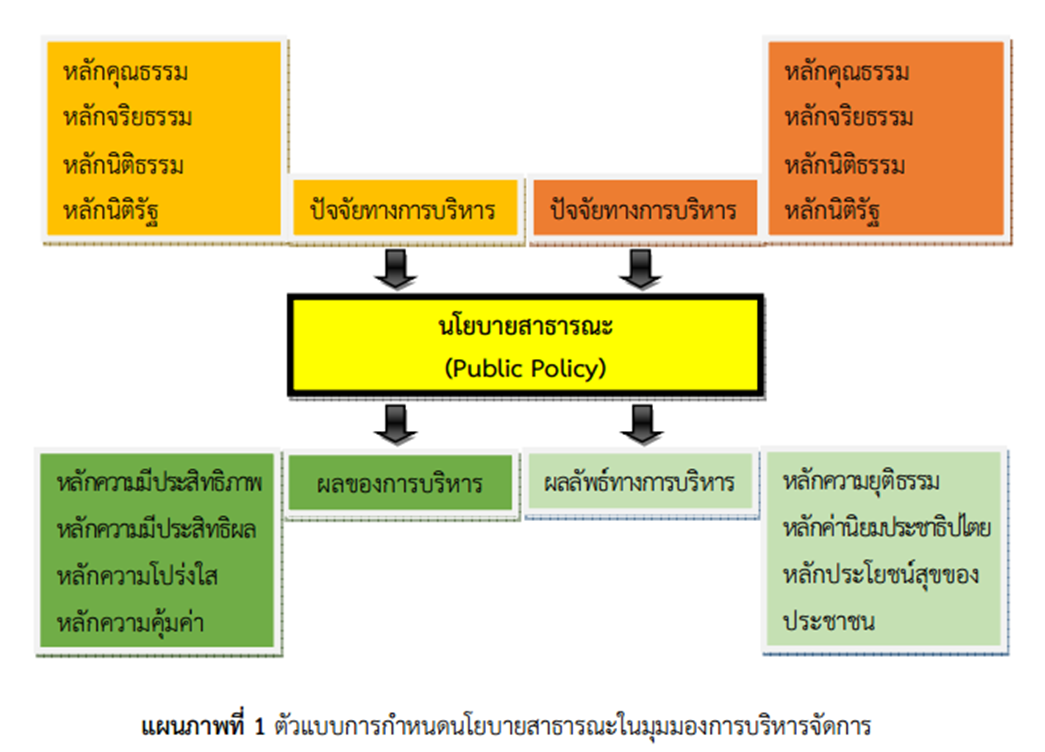MODEL OF PUBLIC POLICY FORMULATION THROUGH THE ADMINISTRATION
Main Article Content
Abstract
This article is intended to explain policy making in relation to management principles and to study the political factors affecting public policy formulation through the management perspective. Throughout the presentation of the form of public policy making in terms of management principles. The results of the study found a model of public policy making from a management perspective mean The public policy making through quality management methods primarily affects the highest performance. That is, good governance in public policy making, which outlines the elements of good governance for consideration that is 1) Administrative factors such as morality, ethics, rule of law and rule of law. 2) Management methods or processes are: principle of participation Principles of checks and balances responsibility principle and the principle of decentralization. 3) The results of management are the principle of efficiency. Effectiveness Principles transparency principle Value principle and response principles and 4) administrative outcomes, i.e. the principle of justice democratic values and the principles of public welfare.
Article Details

This work is licensed under a Creative Commons Attribution-NonCommercial-NoDerivatives 4.0 International License.
References
กุลธน ธนาพงศธร. (2535). หลักการกำหนดนโยบายของรัฐ. กรุงเทพมหานคร : มหาวิทยาลัยธรรมศาสตร์.
จุมพล หนิมพานิช. (2547). การวิเคราะห์นโยบาย : ขอบข่าย แนวคิด ทฤษฎีและกรณีตัวอย่าง. นนทบุรี : โรงพิมพ์มหาวิทยาลัยสุโขทัยธรรมาธิราช.
ธงชัย คล้ายแสง. (2562). หลักธรรมาภิบาลกับการบริหารจัดการภาครัฐแนวใหม่. วารสารวิจยวิชาการ. 2(2). 177-188.
ธงชัย สันติวงษ์. (2539). องค์การและการบริหาร. กรุงเทพมหานคร : ไทยวัฒนาพานิช.
บุรฉัตร จันทร์แดง และคณะ. (2562). กรอบแนวคิดการวิจัยเชิงพฤติกรรมศาสตร์. วารสารสหวิทยาการวิจัย: ฉบับบัณฑิตศึกษา. 8(1). 49- 60.
ปกรณ์ ปรียากร. (2539). เอกสารประกอบการบรรยายวิชาการบริหารโครงการระบบการจัดการโครงการ. กรุงเทพมหานคร : คณะรัฐประศาสนศาสตร์ สถาบันบัณฑิตพัฒนบริหารศาสตร์.
พิทยา บวรวัฒนา. (2543). รัฐประศาสนศาสตร์ : ทฤษฎีและแนวการศึกษา(ค.ศ.1887-ค.ศ.1970). กรุงเทพมหานคร : คณะรัฐศาสตร์ จุฬาลงกรณ์มหาวิทยาลัย.
พิมลจรรย์ นามวัฒน์. (2544). ความรู้ทั่วไปเกี่ยวกับการบริหารธุรกิจ. พิมพ์ครั้งที่ 5. กรุงเทพมหานคร :เท็กซ์ แอนด์ เจอร์นัล.
รงค์ บุญสวยขวัญ. (2560). การเมืองของนโยบาย (Politics of Policy). วารสารสถาบันวิจัยญาณสังวร. 8(1). 197-203.
ลัดดา ผลวัฒนะ. (2557). ธรรมาภิบาลกับการบริหารมหาวิทยาลัย. วารสารการบริหารการศึกษามหาวิทยาลัยบูรพา. 8(2). 16-27.
วิรัช สงวนวงศ์วาน. (2547). การจัดการและพฤติกรรมองค์กร. กรุงเทพมหานคร : เพียร์สัน เอ็ดดูเคชั่นอินโดไซน่า.
ศุภชัย ยาวะประภาษ. (2538). นโยบายสาธารณะ. กรุงเทพมหานคร : จุฬาลงกรณ์มหาวิทยาลัย.
สมคิด ดวงจักร์ และอิมรอน มะลูลีม. (2555). ประสิทธิผลของนโยบายการบริหารจัดการตามหลักธรรมาภิบาลในมหาวิทยาลัยราชภัฏ. วารสารสังคมศาสตร์และมนุษยศาสตร์. 38(2). 57-70.
สมยศ นาวีการ. ( 2526). ทฤษฎีองค์การ. กรุงเทพมหานคร : บรรณกิจ.
สัญญา เคณาภูมิ. (2559). กระบวนทัศน์ธรรมาภิบาล : กรอบแนวคิดทางการบริหารการปกครอง. วารสารวิถีสังคมมนุษย์. 4(1). 123-143.
อมร รักษาสัตย์. (2525). บทบาทจากผู้บังคับบัญชาในการส่งเสริมประสิทธิภาพของข้าราชการ. รัฐประศาสนศาสตร์. 6(1). 27-35.
อิงฟ้า สิงห์น้อย และรัฐชาติ ทัศนัย. (2563). นโยบายสาธารณะ: การบริหารและการจัดการภาครัฐ. วารสารสันติศึกษาปริทรรศน์ มจร. 6(ฉบับพิเศษ). 610-623.
David Easton. (1953). The Political System An Inquiry in to the State of Political Science. New York : Alfred A. Knorf.
Thomas R., Dye, (1978). Understanding Public Policy. 3rd ed. Engle-wood Cliffs, N.J. : Prentice Hall.


